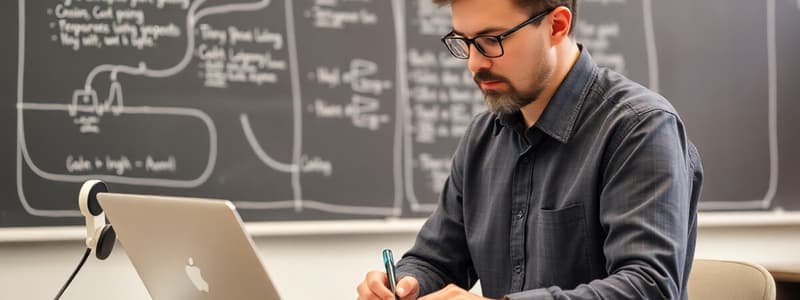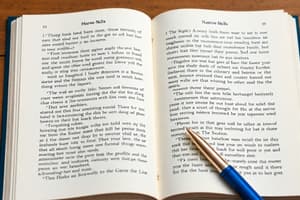Podcast
Questions and Answers
What is the primary goal of integrating English literature into an engineering curriculum?
What is the primary goal of integrating English literature into an engineering curriculum?
- To replace technical knowledge with literary expertise.
- To reduce the amount of technical coursework required for engineering students.
- To enhance communication skills, critical thinking, and appreciation of literary techniques. (correct)
- To fulfill general education requirements without practical application.
The course primarily focuses on replacing technical engineering knowledge with literary analysis.
The course primarily focuses on replacing technical engineering knowledge with literary analysis.
False (B)
Name two specific skills that students are expected to improve through the integration of English literature into their engineering studies.
Name two specific skills that students are expected to improve through the integration of English literature into their engineering studies.
communication skills, critical thinking
In the technical writing workshop, students are expected to focus on three key components: clarity, conciseness, and ______.
In the technical writing workshop, students are expected to focus on three key components: clarity, conciseness, and ______.
Match each activity with its primary learning focus:
Match each activity with its primary learning focus:
Which literary work is used in Unit 1 to illustrate the importance of storytelling in engineering?
Which literary work is used in Unit 1 to illustrate the importance of storytelling in engineering?
In the "Technology vs. Ethics" debate, students are discouraged from using literary examples to support their arguments.
In the "Technology vs. Ethics" debate, students are discouraged from using literary examples to support their arguments.
What type of writing is emphasized in Activity 6, which uses examples like Dr. Martin Luther King Jr.'s speeches?
What type of writing is emphasized in Activity 6, which uses examples like Dr. Martin Luther King Jr.'s speeches?
Students submit a poem and a ______ reflecting on how the writing process influenced their engineering outlook.
Students submit a poem and a ______ reflecting on how the writing process influenced their engineering outlook.
Match the assessment component with its corresponding weight in the overall course grade:
Match the assessment component with its corresponding weight in the overall course grade:
What is the focus of Assignment 2 in Unit 2?
What is the focus of Assignment 2 in Unit 2?
The interdisciplinary project requires students to avoid using creative visuals in their presentations.
The interdisciplinary project requires students to avoid using creative visuals in their presentations.
What is the purpose of the reflective journal submitted at the end of the course?
What is the purpose of the reflective journal submitted at the end of the course?
Activity 4 involves a debate on "Technology vs. ______", encouraging students to consider potential adverse effects of technological advancements.
Activity 4 involves a debate on "Technology vs. ______", encouraging students to consider potential adverse effects of technological advancements.
Match the following literary element with its application:
Match the following literary element with its application:
Which skill does the course aim to enhance by analyzing characters' motivations in literary texts?
Which skill does the course aim to enhance by analyzing characters' motivations in literary texts?
The course requires students to strictly adhere to traditional essay formats in all written assignments.
The course requires students to strictly adhere to traditional essay formats in all written assignments.
Aside from technical expertise, what 'soft skill' is improved through narrative creation around an engineering project?
Aside from technical expertise, what 'soft skill' is improved through narrative creation around an engineering project?
The course uses literature to facilitate discussions on how engineering impacts ______.
The course uses literature to facilitate discussions on how engineering impacts ______.
Associate the course component with its application in future careers:
Associate the course component with its application in future careers:
Flashcards
Engineering and Literature
Engineering and Literature
Understanding the relationship between engineering principles and literary techniques.
Effective Technical Writing
Effective Technical Writing
Clarity, conciseness, and organization in conveying technical information.
Narrative Techniques in Engineering
Narrative Techniques in Engineering
Using stories to illustrate challenges and solutions in engineering projects.
Literary Analysis in Engineering
Literary Analysis in Engineering
Signup and view all the flashcards
Technology vs. Ethics Debate
Technology vs. Ethics Debate
Signup and view all the flashcards
Poetry in Engineering
Poetry in Engineering
Signup and view all the flashcards
Persuasive Writing
Persuasive Writing
Signup and view all the flashcards
Interdisciplinary Project
Interdisciplinary Project
Signup and view all the flashcards
Reflective Journal
Reflective Journal
Signup and view all the flashcards
Enhanced Communication Skills
Enhanced Communication Skills
Signup and view all the flashcards
Study Notes
- This value-added course aims to teach engineering students the intersection of engineering and English literature.
- The goal is to improve communication, critical thinking, and literary appreciation to enrich professional and personal lives.
Standards Alignment
- The lesson aligns with state standards for English Language Arts and Communication Skills.
- Seeks to enhance analytical, writing, and discussion abilities.
Materials
- Textbook: "Engineering and Literature: Bridging the Gap" by John A. Smith
- Anthology: "Literature and Engineering: A Critical Perspective" compiled by Emily Brown
- Access to online literary databases
- Whiteboard and markers; Projector and screen
- Handouts with literary excerpts, discussion questions, grammar exercises, and assignment guidelines.
Class Structure
Introduction (2 Hours)
- Course overview: Importance of literature in engineering.
- Communication and narrative skills in engineering fields (reports, presentations, teamwork) get discussed.
- Students share favorite literary works and how they relate to their engineering pursuits as an icebreaker.
Unit 1: The Art of Communication (10 hours)
- Learning Focus: Enhancing technical writing skills and understanding narrative structure.
Activity 1: Technical Writing Workshop (5 hours)
- Discuss components of effective technical writing: clarity, conciseness, and organization.
- Students write a technical report on a given engineering topic (e.g., renewable energy systems).
- Students share reports in groups and provide peer feedback.
- Class discussion: Literary techniques that can improve technical writing.
- Assignment 1: Submit the final draft of the technical report (due in two weeks).
Activity 2: Narrative Techniques in Engineering (5 hours)
- Lecture on the importance of storytelling in engineering (case studies, project presentations).
- Selected excerpts get read from "The Innovator’s Dilemma" by Clayton Christensen.
- Students create a narrative around a project, focusing on challenges and solutions.
- Narratives get shared in pairs, with class reflection afterward.
Unit 2: Critical Thinking through Literature (10 hours)
- Learning Focus: Developing critical analysis and interpretation skills using various literary works.
Activity 3: Literary Analysis Workshop (5 hours)
- Texts that embody themes relevant to engineering get assigned (e.g., "Frankenstein" by Mary Shelley).
- Analyze characters' motivations, ethical considerations, and reflect on what these mean for future engineers.
- Create a mind map connecting themes from the text to modern engineering problems.
- Assignment 2: Write a literary analysis essay (3-5 pages) on how the selected texts relate to current engineering ethics (due in three weeks).
Activity 4: Debate: Technology vs. Ethics (5 hours)
- Class splits into two teams (pro and con) and gets assigned a contemporary technological issue (e.g., AI in job displacement).
- Teams prepare arguments based on insights gained from readings and discussions.
- Teams present their positions, followed by rebuttals.
- The activity concludes with reflections on how engineering decisions impact society, using literary examples.
Unit 3: Creative Expression in Engineering (10 hours)
- Learning Focus: Emphasizing creativity and originality in conveying ideas.
Activity 5: Poetic Explorations (5 hours)
- Poetry and its elements are introduced.
- Discuss how engineers can use poetic techniques to inspire creativity in design and innovation.
- Students write an original poem tying their engineering discipline to a broader human experience.
- Optional multimedia presentation: Students can present their poems in creative formats (e.g., visual art, spoken word).
- Assignment 3: Submit the poem and a reflection (300-500 words) on how the process of writing influenced their engineering outlook (due in two weeks).
Activity 6: The Power of Persuasion (5 hours)
- Teach the principles of persuasive writing using classic speeches (e.g., Dr. Martin Luther King Jr.’s “I Have a Dream”).
- Students select an engineering topic of personal interest and write a persuasive letter advocating for a specific change or development.
- Students exchange letters for peer review.
Unit 4: Integrative Project (13 hours)
- Learning Focus: Applying learned concepts through interdisciplinary project work.
Activity 7: Interdisciplinary Project (10 hours)
- Groups of students select an engineering challenge relevant to today’s world (e.g., climate change, sustainable design).
- Students conduct research, create a narrative framing the problem, and develop a presentation that combines technical solutions with literary elements (storytelling, creative visuals).
- Projects are presented at a class symposium, where peers and faculty provide feedback.
- Assignment 4: Reflective journal (1000-1500 words) to detail their learning journey throughout the course, the challenges faced, and how the integration of literature enhanced their understanding of engineering (due at the end of the course).
Assessment Overview:
- Participation in discussions and activities (20%)
- Technical report (20%)
- Literary analysis essay (20%)
- Poem and reflection (20%)
- Interdisciplinary project (20%)
Conclusion (2 Hours):
-
Reflection on the role of literature in engineering practices.
-
Discuss future applications of skills learned in the course.
-
Final thoughts and wrap-up session.
-
By the end of this 45-hour course, students will have developed enhanced communication skills through the effective integration of English literature into engineering concepts.
-
Students will be enabled to engage meaningfully in both technical and creative discussions in their future careers.
Studying That Suits You
Use AI to generate personalized quizzes and flashcards to suit your learning preferences.




